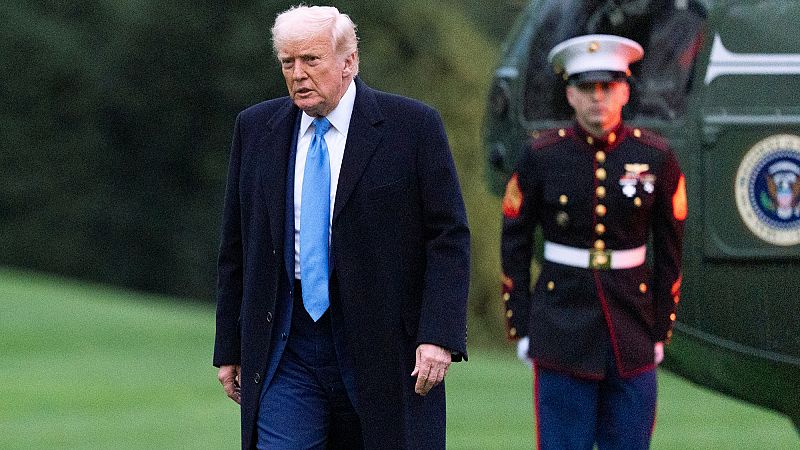
US President Donald Trump insisted he had not deliberately triggered the intense market sell-offs but reaffirmed his goal of eliminating the US trade deficit. Global equity markets have tumbled since Trump unveiled higher-than-expected reciprocal tariffs last week, wiping out trillions on Wall Street. On Friday, China responded with retaliatory tariffs, imposing 34% import levies on all US goods, marking a major escalation in the global trade war.
“I don’t want anything to go down, but sometimes you have to take medicine to fix something,” Trump said aboard Air Force One at the weekend. “We have to solve our trade deficit with China,” he continued. “We have a trillion-dollar trade deficit with China—hundreds of billions of dollars a year we lose. Unless we solve that problem, I’m not going to make a deal.”
Trump also demanded financial reparations from Europe: “We put a big tariff on Europe. They are coming to the table; they want to talk, but there’s no talk unless they pay us a lot of money on a yearly basis—not just for the present, but also for the past.”
Last week, the President said he was open to negotiations if other countries offer something “phenomenal”.
Asian stock markets extend losses
Equities across Asia and US stock futures extended losses during Monday’s Asian session, as the escalating global trade war continued to pressure investor sentiment.
Hong Kong’s Hang Seng Index plunged nearly 10% at the open on the return from a public holiday last Friday, erasing all gains since February. Chinese equities had rallied strongly earlier in the year on the back of DeepSeek’s launch of a lower-cost AI model, coupled with Beijing’s pledge for further stimulus. The Hang Seng Index had risen 24% from the start of 2025 to a peak on 19 March, before Trump’s reciprocal tariff announcement. Following the steep sell-off, the index is now up just 3.2% year-to-date.
Japan’s benchmark Nikkei 225 dropped 6% to an 18-month low in early trade, triggering a circuit breaker. The index has now declined over 20% from its January highs, entering bear market territory. South Korea’s Kospi index shed more than 4%, while Australia’s ASX 200 also declined by nearly 4%. Although the three benchmarks later recovered some ground, they remained in negative territory intraday.
“There could be big rallies this week on positive headlines. But there won't be a sustainable move until Trump indicates he has no intention to raise tariffs further and is open to negotiating lower tariffs with trading partners… It's as simple as that, really,” said Kyle Rodda, senior market analyst at Capital.com.
US futures drop, likely to ripple through European markets
US stock futures extended their declines, pointing to a sharply lower open on Monday. As of 4:45 a.m. Central European Time, S&P 500 futures were down 3.5%, Nasdaq futures slumped 4.5%, and the Dow Jones Industrial Average futures declined 2.9%. Meanwhile, the CBOE Volatility Index (VIX), commonly referred to as Wall Street’s “fear gauge,” surged 51% last week to above 45—a level not seen since 2020 and only briefly touched last August.
The sharp US sell-off is expected to ripple across European markets as EU leaders prepare countermeasures against Trump’s sweeping tariffs. “This morning’s note is going to be a depressing one. At this point, I’m quickly running out of adjectives to describe how gloomy sentiment is becoming, and how grim the economic outlook now appears. Plus, both of those are likely to get considerably worse, before improving,” Michale Brown, a senior research analyst at Pepperstone London, wrote in a note.
European indices also tumbled last week, with the Euro Stoxx 600 falling 7.4%, Germany’s DAX down 6.9%, and France’s CAC 40 losing 7.1%.
Investors seek haven assets
Amid the market turmoil, investors turned to traditional safe-haven assets, sending the euro, Japanese yen, Swiss franc, and government bonds higher.
The euro surged against the US dollar to above 1.10 at one point last week, marking a six-month high. The EUR/USD pair stabilised above 1.09 during Monday’s Asian session following Friday’s retreat. Meanwhile, both the yen and the Swiss franc also strengthened to their highest levels against the dollar since October 2024.
US government bonds rallied sharply as yields plunged, with the 10-year Treasury yield falling below 4% for the first time since October 2024. In Europe, the yield on Germany’s 10-year bund also dropped to a four-month low.
However, gold futures declined in early Monday trade, extending losses from an all-time high last week as investors sold the metal to cover equity losses. Despite the pullback, analysts expect gold to remain a top-performing haven asset in the current environment.







